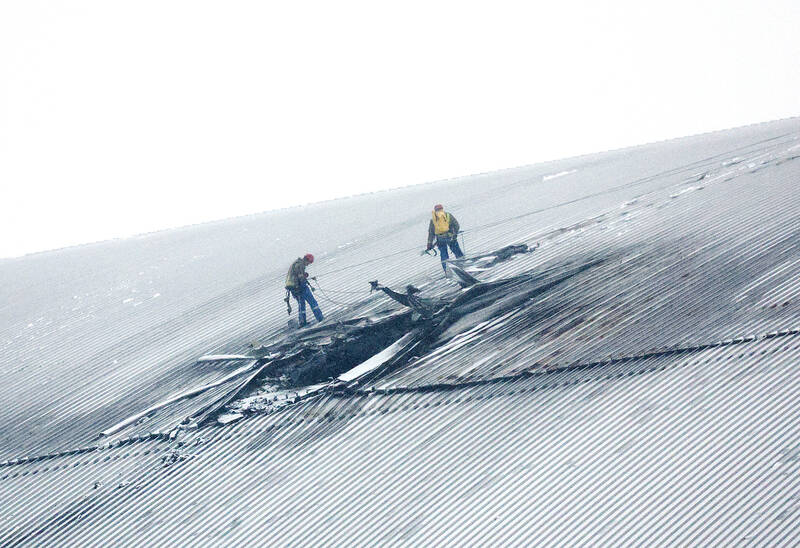A drone armed with a warhead hit the protective outer shell of Ukraine’s Chernobyl nuclear plant early on Friday, punching a hole in the structure and briefly starting a fire, in an attack Kyiv blamed on Russia.
The Kremlin denied it was responsible.
Radiation levels at the shuttered plant in the Kyiv region — site of the world’s worst civilian nuclear incident — have not increased, the UN International Atomic Energy Agency (IAEA) said, adding that the strike did not breach the plant’s inner containment shell.

Photo: EPA-EFE
The IAEA did not attribute blame, saying only that its team stationed at the site heard an explosion and was informed that a drone had struck the shell.
Fighting around nuclear plants has repeatedly raised fears of a catastrophe during three years of war, particularly in a country where many vividly remember the 1986 Chernobyl disaster, which spewed radioactive fallout over much of the northern hemisphere.
The Zaporizhzhia nuclear power plant, which is Europe’s biggest, has occasionally been hit by drones during the war without causing significant damage.
The strike came two days after US President Donald Trump upended Washington’s policy on Ukraine, saying he would meet with Russian President Vladimir Putin to discuss ending the war. The move seemed to identify Putin as the only player that matters and looked set to sideline Ukrainian President Volodymyr Zelenskiy, as well as European governments, in any peace talks.
The hit on Chernobyl occurred as Ukraine is being slowly pushed back by Russia’s bigger army along parts of the 1,000km front line and is desperately seeking more Western help.
Zelenskiy said a Russian drone with a high-explosive warhead hit the plant’s outer shell and started a fire, which has been put out. The shell was built in 2016 over another heavy concrete containment structure, which was placed on the plant’s fourth reactor soon after the 1986 disaster. Both shells seek to prevent radiation leaks.
The Ukrainian Emergency Service provided a photograph that showed a hole in the roof of the outer shield, which is a massive steel-and-concrete structure weighing about 40,000 tonnes and tall enough to fit Paris’ Notre Dame cathedral inside.
There was “no immediate danger” to the facility or risk of radioactive leaks, said Oleksandr Kharchenko, director of the Kyiv-based Center for Research on Energy and Clean Air.
“The protective structure is strong and reliable, though it has been damaged,” he said.
Kremlin spokesman Dmitry Peskov denied Russia was responsible.
“There is no talk about strikes on nuclear infrastructure, nuclear energy facilities. Any such claim isn’t true. Our military doesn’t do that,” Peskov said in a conference call with reporters.
It was not possible to independently confirm who was behind the strike. Both sides frequently trade blame when nuclear sites come under attack.
In Munich, Germany, Zelenskiy told reporters that he thinks the blow against Chernobyl was a “very clear greeting from Putin and Russian Federation” to the conference.

Taiwan is projected to lose a working-age population of about 6.67 million people in two waves of retirement in the coming years, as the nation confronts accelerating demographic decline and a shortage of younger workers to take their place, the Ministry of the Interior said. Taiwan experienced its largest baby boom between 1958 and 1966, when the population grew by 3.78 million, followed by a second surge of 2.89 million between 1976 and 1982, ministry data showed. In 2023, the first of those baby boom generations — those born in the late 1950s and early 1960s — began to enter retirement, triggering

One of two tropical depressions that formed off Taiwan yesterday morning could turn into a moderate typhoon by the weekend, the Central Weather Administration (CWA) said yesterday. Tropical Depression No. 21 formed at 8am about 1,850km off the southeast coast, CWA forecaster Lee Meng-hsuan (李孟軒) said. The weather system is expected to move northwest as it builds momentum, possibly intensifying this weekend into a typhoon, which would be called Mitag, Lee said. The radius of the storm is expected to reach almost 200km, she said. It is forecast to approach the southeast of Taiwan on Monday next week and pass through the Bashi Channel

NO CHANGE: The TRA makes clear that the US does not consider the status of Taiwan to have been determined by WWII-era documents, a former AIT deputy director said The American Institute in Taiwan’s (AIT) comments that World War-II era documents do not determine Taiwan’s political status accurately conveyed the US’ stance, the US Department of State said. An AIT spokesperson on Saturday said that a Chinese official mischaracterized World War II-era documents as stating that Taiwan was ceded to the China. The remarks from the US’ de facto embassy in Taiwan drew criticism from the Ma Ying-jeou Foundation, whose director said the comments put Taiwan in danger. The Chinese-language United Daily News yesterday reported that a US State Department spokesperson confirmed the AIT’s position. They added that the US would continue to

The number of Chinese spouses applying for dependent residency as well as long-term residency in Taiwan has decreased, the Mainland Affairs Council said yesterday, adding that the reduction of Chinese spouses staying or living in Taiwan is only one facet reflecting the general decrease in the number of people willing to get married in Taiwan. The number of Chinese spouses applying for dependent residency last year was 7,123, down by 2,931, or 29.15 percent, from the previous year. The same census showed that the number of Chinese spouses applying for long-term residency and receiving approval last year stood at 2,973, down 1,520,